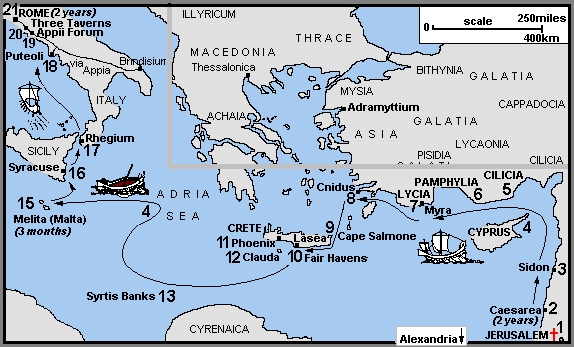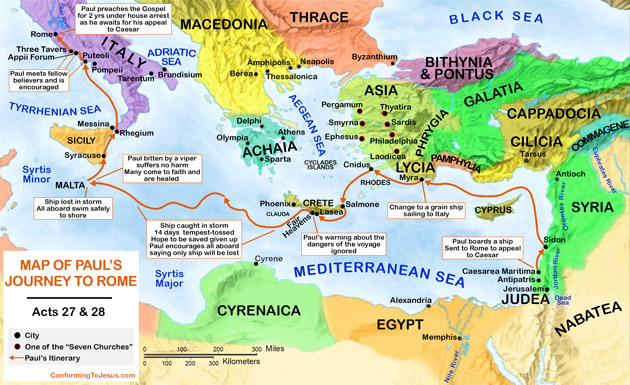
Julius – centurian whp accompnied Paul to Italy via ship. Luke was also with them (author).
Paul hears from God and realizes that the voyage would end in disaster.
Paul warns the crew that they would lose the cargo and the ship. The crew refuses to listen to him and want to go on.
A terrible typhoon began and the ship was caught up in it, pulling the ship off course.
They lost control of the ship and were at the mercy of the sea.
The crew struggled to secure their skiffs to potentially serve as a means of escape.
The waves were so bad they lashed cables around the ship to keep it from being torn apart by the waves.
When things are out of control like this the tendancy is to go into survival mode.
The crew began throwing cargo and tackle overboard to lighten the ship. They continued like this for many days.
The storm was so bad they couldn’t see te sun for several days.
Instead of being angry Paul reassured them an angel told him that the crew would survive but the ship wouldn’t.
The storm lasted for 14 nights. On the 14th night they realized they were near land and shallow ground.
The crew cuts the rope for the skiff and lets it fall, making the ship lighter. This initially seemed like a bod idea but was an illustration of following God’s will.
The crew had trained themselves not to eat because their food was limiited. Paul encouraged them to eat so they could survive.
Paul reminded the crew that they were going to survive, not because of their efforts but because God has willed it. The crew then throws the last of their food into the sea to lighten the ship even further.
The crew decide to run the shop aground – the stern (back end) was being destroyed by waves. The soldiers debate on killing all the prisoners to prevent them from escaping but the centurian wanted to save Paul ab told everyone to jump overboard and swim for shore. THe men that were unable to swim still somehow survived and managed to live. The entire crew (276 men) managed to make it to shore as Paul had predicted.
When things don’t go your way and all seems lost you must be like Paul – don’t lose faith and encourage everyone to do the same.
Like the sailors, sometimes we’re still “holding onto the skiff” when God asks us to do something. We need to trust God and cut the rope.
You may one day be on a shop in a storm. When or if this happens, stay the course and trust God. If God can get 276 men through such a storm He can also get you through your challenges.


